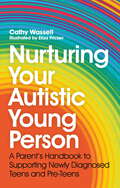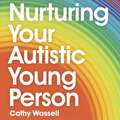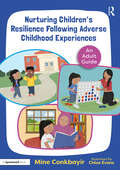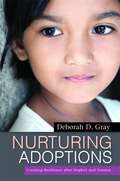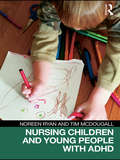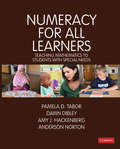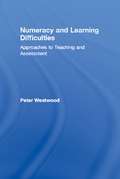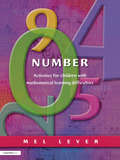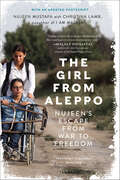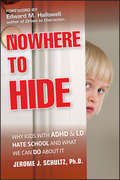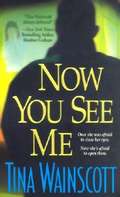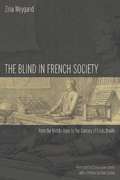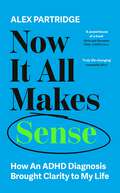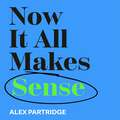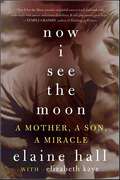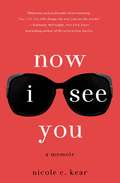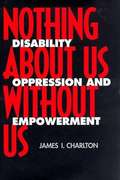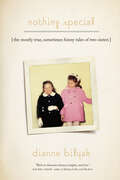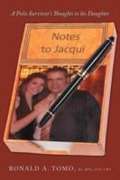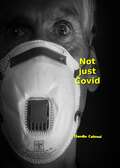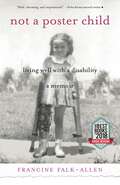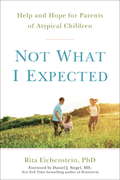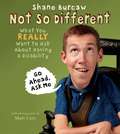- Table View
- List View
Nurturing Your Autistic Young Person: A Parent’s Handbook to Supporting Newly Diagnosed Teens and Pre-Teens
by Cathy WassellAs the parent of a child recognised as autistic as a pre-teen or teen, it can often feel difficult to find the answers you need. Children who make it to late primary/early secondary age before being picked up by the system tend to present with traits that are harder to spot, meaning it can be harder to engage professionals in the diagnostic process and gather the necessary support.Cathy Wassell, CEO of Autistic Girls Network, has tailored this handbook to support parents with older children or teenagers who are at the identification stage, walking them through the basics in an engaging and accessible manner. She addresses key challenges for this age group, including co-occurring conditions, puberty, and safeguarding, as well as looking to the future, advising on schooling options, and beyond.Designed to help parents become fully informed and ensure a nurturing and positive environment for our autistic young people, this is a guide with a focus on difference - not deficit.
Nurturing Your Autistic Young Person: A Parent’s Handbook to Supporting Newly Diagnosed Teens and Pre-Teens
by Cathy WassellAs the parent of a child recognised as autistic as a pre-teen or teen, it can often feel difficult to find the answers you need. Children who make it to late primary/early secondary age before being picked up by the system tend to present with traits that are harder to spot, meaning it can be harder to engage professionals in the diagnostic process and gather the necessary support.Cathy Wassell, CEO of Autistic Girls Network, has tailored this handbook to support parents with older children or teenagers who are at the identification stage, walking them through the basics in an engaging and accessible manner. She addresses key challenges for this age group, including co-occurring conditions, puberty, and safeguarding, as well as looking to the future, advising on schooling options, and beyond.Designed to help parents become fully informed and ensure a nurturing and positive environment for our autistic young people, this is a guide with a focus on difference - not deficit.
Nurturing Children's Resilience Following Adverse Childhood Experiences: An Adult Guide (Maya's ACE Adventures!)
by Mine ConkbayirFor effective use, this book should be purchased alongside the accompanying storybook, Maya’s ACE Adventures!: A Story to Celebrate Children’s Resilience following Adverse Childhood Experiences [9781032368177]. Both books can be purchased together as a set, Helping Children to Thrive After Adverse Childhood Experiences: ‘Maya’s ACE Adventures!’ Storybook and Adult Guide [9781032367934]. Alongside the accompanying storybook, Maya’s ACE Adventures!, this guide provides adults with much-needed resources to talk to children about their traumatic experiences in ways that are non-threatening, safe, and can build a child’s confidence in speaking about their fears with a trusted adult. Designed to be read by an adult before they read the story together with a child, the guide provides practical tools, such as scene-by-scene discussion prompts and strategies for co-regulation, to facilitate conversations that are informed, relaxed and allow for healing from grief and trauma. These tools are contextualised by a detailed examination and critique of the Adverse Childhood Experiences (ACEs) framework, in addition to an overview of the neurobiology involved in the stress response, to support adults and alleviate their anxiety about asking the right questions and having the rights answers for the children they support. Together with the storybook, this guide is essential reading for teachers, parents, foster carers, social workers, and other professionals who are supporting children, by giving them the resources they need to foster hope and resilience among children who have survived traumatic experiences.
Nursing Children and Young People with ADHD
by Tim McDougall Noreen RyanADHD is one of the most commonly diagnosed behavioural disorders in children and young people. It is a complex and contested condition, with potential causes and treatments in biological, psychological and social domains. This is the first comprehensive text for nurses and other health professionals in this field. Nursing Children and Young People with ADHD explores the evidence, incorporating and expanding on the new NICE guidelines for practice in this area, to provide an essential knowledge base for practice. The text covers: causes, diagnosis, co-morbidity, user and carer perspectives, assessment, treatment and interventions (including those suitable for use in schools), prescribing and the legal background. An invaluable text for pre-registration student nurses on mental health and children branches, this will also be a useful reference work for post-registration nurses and health professionals seeking evidence-based recommendations for practice.
Numeracy for All Learners: Teaching Mathematics to Students with Special Needs (Math Recovery)
by Pamela D Tabor Anderson Norton Amy J Hackenberg Dawn DibleyNumeracy for All Learners is a wide-ranging overview of how Math Recovery® theory, pedagogy, and tools can be applied meaningfully to special education to support learners with a wide range of educational needs. It builds on the first six books in the Math Recovery series and presents knowledge, resources, and examples for teachers working with students with special needs from Pre-K through secondary school. Key topics include: dyscalculia, what contemporary neuroscience tells us about mathematical learning, and differentiating assessment and instruction effectively to meet the needs of all students in an equitable framework.
Numeracy for All Learners: Teaching Mathematics to Students with Special Needs (Math Recovery)
by Pamela D Tabor Anderson Norton Amy J Hackenberg Dawn DibleyNumeracy for All Learners is a wide-ranging overview of how Math Recovery® theory, pedagogy, and tools can be applied meaningfully to special education to support learners with a wide range of educational needs. It builds on the first six books in the Math Recovery series and presents knowledge, resources, and examples for teachers working with students with special needs from Pre-K through secondary school. Key topics include: dyscalculia, what contemporary neuroscience tells us about mathematical learning, and differentiating assessment and instruction effectively to meet the needs of all students in an equitable framework.
Numeracy and Learning Difficulties: Approaches to Teaching and Assessment (Learning Difficulties Ser.)
by Peter WestwoodBy understanding why children struggle with maths, teachers are better equipped to provide effective support and nurture confidence in low-achievers. Numeracy and Learning Difficulties includes how to tackle common learning difficulties by following different teaching practices and principles, identifying gaps in students' knowledge and developing curricula that bridges these gaps, improves numerical literacy using problem-solving strategies and skills, and a handy checklist of benchmarks in achievement.
Number: Activities for Children with Mathematical Learning Difficulties
by Mel LeverFirst Published in 2003. Routledge is an imprint of Taylor & Francis, an informa company.
Nujeen: One Girl's Incredible Journey from War-Torn Syria in a Wheelchair
by Christina Lamb Nujeen MustafaPrize-winning journalist and the co-author of smash New York Times bestseller I Am Malala, Christina Lamb, now tells the inspiring true story of another remarkable young hero: Nujeen Mustafa, a teenager born with cerebral palsy, whose harrowing journey from war-ravaged Syria to Germany in a wheelchair is a breathtaking tale of fortitude, grit, and hope that lends a face to the greatest humanitarian issue of our time, the Syrian refugee crisis.For millions around the globe, sixteen-year-old Nujeen Mustafa embodies the best of the human spirit. Confined to a wheelchair because of her cerebral palsy and denied formal schooling in Syria because of her illness, Nujeen taught herself English by watching American soap operas. When her small town became the epicenter of the brutal fight between ISIS militants and US-backed Kurdish troops in 2014, she and her family were forced to flee.Despite her physical limitations, Nujeen embarked on the arduous trek to safety and a new life. The grueling sixteen-month odyssey by foot, boat, and bus took her across Turkey and the Mediterranean to Greece, through Macedonia to Serbia and Hungary, and finally, to Germany. Yet, in spite of the tremendous physical hardship she endured, Nujeen's extraordinary optimism never wavered. Refusing to give in to despair or see herself as a passive victim, she kept her head high. As she told a BBC reporter, "You should fight to get what you want in this world."Nujeen's positivity and resolve infuses this unforgettable story of one young woman determined to make a better life for herself. Told by acclaimed British foreign correspondent Christina Lamb, Nujeen is a unique and powerful memoir that gives voice to the Syrian refugee crisis, helping us to understand that the world must change—and offering the inspiration to make that change reality.
Nowhere to Hide
by Jerome J. SchultzA new approach to help kids with ADHD and LD succeed in and outside the classroom This groundbreaking book addresses the consequences of the unabated stress associated with Learning disabilities and ADHD and the toxic, deleterious impact of this stress on kids' academic learning, social skills, behavior, and efficient brain functioning. Schultz draws upon three decades of work as a neuropsychologist, teacher educator, and school consultant to address this gap. This book can help change the way parents and teachers think about why kids with LD and ADHD find school and homework so toxic. It will also offer an abundant supply of practical, understandable strategies that have been shown to reduce stress at school and at home. Offers a new way to look at why kids with ADHD/LD struggle at school Provides effective strategies to reduce stress in kids with ADHD and LD Includes helpful rating scales, checklists, and printable charts to use at school and home This important resource is written by a faculty member of Harvard Medical School in the Department of Psychiatry and former classroom teacher.
Now You See Me
by Tina WainscottEVERYTHING SHE FEARS... Olivia was eight years old when she was trapped in the twisted fantasies of a kidnapper. Escaping with her life, the trauma left her blind, and her innocence shattered. But Olivia would escape with something else--a psychic gift that has become her greatest weapon... EVERYTHING SHE SEES... Sixteen years to the day, it's happened again. A little girl named Phaedra has disappeared. Olivia saw it happen. In her private darkness came the visions: the toys... the chloroform... the scissors... the cage... WILL COME TRUE IN THE DARK. Olivia shares the stark fear in the young girl's eyes, and the terrifying fate only Olivia can stop. But to find the fiendish killer and save Phaedra means returning to the terrors of her own past--and opening her eyes to an inescapable new nightmare.
Now We Are Citizens: The Blind in French Society from the Middle Ages to the Century of Louis Braille
by Zina Weygand Emily-Jane Cohen<P>The integration of the blind into society has always meant taking on prejudices and inaccurate representations. <P>Weygand's highly accessible anthropological and cultural history introduces us to both real and imaginary figures from the past, uncovering French attitudes towards the blind from the Middle Ages through the first half of the nineteenth century. Much of the book, however, centers on the eighteenth century, the enlightened age of Diderot's emblematic blind man and of the Institute for Blind Youth in Paris, founded by Valentin Haüy, the great benefactor of blind people. <P>Weygand paints a moving picture of the blind admitted to the institutions created for them and of the conditions under which they lived, from the officially-sanctioned beggars of the medieval Quinze-Vingts to the cloth makers of the Institute for Blind Workers. She has also uncovered their fictional counterparts in an impressive array of poems, plays, and novels. The book concludes with Braille, whose invention of writing with raised dots gave blind people around the world definitive access to silent reading and to written communication.
Now It All Makes Sense: How An ADHD Diagnosis Brought Clarity To My Life
by Alex PartridgeOne of the most complete and moving accounts I've ever read... On behalf of all of us who grope toward understanding, thank you, Mr Partridge; thank you, thank you, thank you.' Edward Hallowell, MD, author of 'ADHD 2.0' and other books'Alex is rich, successful and an entertaining and concise communicator. Alex is also very ADHD. You want to read this book for all these reasons. It helps that it is short.' Kate Spicer'Truly life changing. The perfect antidote for shame' Samantha Hiew PhD, founder of ADHD Girls'A powerhouse of a book. Deeply validating' Rich and Roxanne Pink (ADHD Love)'Thank you, Alex, for making us feel seen, heard and celebrated!' Martine McCutcheonFROM THE HOST OF THE GLOBALLY ACCLAIMED 'ADHD CHATTER' PODCASTAged just 21, Alex Partridge founded UNILAD and LADBible, social news sites which now have a following of 100 million people around the globe. A legal case over ownership in 2017 tipped him over the edge of the cliff into alcoholism, triggering years of mental health issues until, aged 34, he was diagnosed with ADHD.Now it all makes sense.In his chart-topping podcast, ADHD Chatter, Alex has spoken to dozens of experts on ADHD and related conditions in a bid to understand and improve outcomes for the neurodiverse population - and this groundbreaking book brings them all together, for the first time, in one place.A blend of lived experience and expert insight, this deep dive into ADHD has the power to change your life. If you've ever wondered why you can't remember those critical appointments, how you can be hyper-focused one minute and down a YouTube rabbit-hole 30 seconds later, or why do people walk so slowly? then this relatable and unashamedly honest book is for you.Written with Alex's trademark raw vulnerability, Now It All Makes Sense distils the essence of all the most important need-to-knows, from parenting with (and for) ADHD, to managing your mental health, your finances and even your shopping list. Most importantly it celebrates the opportunities and strengths, unique skillsets and positive traits of ADHD to remind you that you are NOT broken - and you are enough.
Now It All Makes Sense: How An ADHD Diagnosis Brought Clarity To My Life
by Alex PartridgeOne of the most complete and moving accounts I've ever read... On behalf of all of us who grope toward understanding, thank you, Mr Partridge; thank you, thank you, thank you.' Edward Hallowell, MD, author of 'ADHD 2.0' and other books'Alex is rich, successful and an entertaining and concise communicator. Alex is also very ADHD. You want to read this book for all these reasons. It helps that it is short.' Kate Spicer'Truly life changing. The perfect antidote for shame' Samantha Hiew PhD, founder of ADHD Girls'A powerhouse of a book. Deeply validating' Rich and Roxanne Pink (ADHD Love)'Thank you, Alex, for making us feel seen, heard and celebrated!' Martine McCutcheonFROM THE HOST OF THE GLOBALLY ACCLAIMED 'ADHD CHATTER' PODCASTAged just 21, Alex Partridge founded UNILAD and LADBible, social news sites which now have a following of 100 million people around the globe. A legal case over ownership in 2017 tipped him over the edge of the cliff into alcoholism, triggering years of mental health issues until, aged 34, he was diagnosed with ADHD.Now it all makes sense.In his chart-topping podcast, ADHD Chatter, Alex has spoken to dozens of experts on ADHD and related conditions in a bid to understand and improve outcomes for the neurodiverse population - and this groundbreaking book brings them all together, for the first time, in one place.A blend of lived experience and expert insight, this deep dive into ADHD has the power to change your life. If you've ever wondered why you can't remember those critical appointments, how you can be hyper-focused one minute and down a YouTube rabbit-hole 30 seconds later, or why do people walk so slowly? then this relatable and unashamedly honest book is for you.Written with Alex's trademark raw vulnerability, Now It All Makes Sense distils the essence of all the most important need-to-knows, from parenting with (and for) ADHD, to managing your mental health, your finances and even your shopping list. Most importantly it celebrates the opportunities and strengths, unique skillsets and positive traits of ADHD to remind you that you are NOT broken - and you are enough.
Now It All Makes Sense - How An ADHD Diagnosis Changed My Life: The Sunday Times Bestseller from the Founder of LadBible and UniLad
by Alex Partridge'Truly life changing. The perfect antidote for shame' Samantha Hiew PhD, founder of ADHD Girls'A powerhouse of a book. Deeply validating' Rich and Roxanne Pink (ADHD Love)Aged just 21, Alex Partridge founded UNILAD and LADBible, social news sites which now have a following of 100 million people around the globe. A legal case over ownership in 2017 tipped him over the edge of the cliff into alcoholism, triggering years of mental health issues until, aged 34, he was diagnosed with ADHD.Now it all makes sense.In his chart-topping podcast, ADHD Chatter, Alex has spoken to dozens of experts on ADHD and related conditions in a bid to understand and improve outcomes for the neurodiverse population - and this groundbreaking book brings them all together, for the first time, in one place.A blend of lived experience and expert insight, this deep dive into ADHD has the power to change your life. If you've ever wondered why you can't remember those critical appointments, how you can be hyper-focused one minute and down a YouTube rabbit-hole 30 seconds later, or why do people walk so slowly? then this relatable and unashamedly honest book is for you.Written with Alex's trademark raw vulnerability, Now It All Makes Sense distils the essence of all the most important need-to-knows, from parenting with (and for) ADHD, to managing your mental health, your finances and even your shopping list. Most importantly it celebrates the opportunities and strengths, unique skillsets and positive traits of ADHD to remind you that you are NOT broken - and you are enough.
Now I See the Moon: A Mother, a Son, and the Miracle of Autism
by Elizabeth Kaye Elaine Hall“Now I See the Moon provides insightful ways to teach and work with individuals with autism and severe disabilities. It will give parents great hope.” — Temple Grandin, author of Thinking in Pictures“This magnificent work vividly demonstrates the joy and hope of discovering the creative and emotional capacities which exist in all children, but especially in those children with autism and other special needs.” — Dr. Stanley Greenspan, author of The Child with Special Needs and Engaging AutismWhen her son Neal was diagnosed with autism, former Hollywood acting coach Elaine Hall, aka “Coach E,” took matters into her own hands and used her resources to guide him toward an increasingly independent life. In the process, she founded The Miracle Project, a groundbreaking organization that uses the performing arts to connect with children with autism. Both controversial and unorthodox, Hall’s innovative approach has been praised by leaders in the field of autism. She was also the subject of an Emmy-Award-winning documentary Autism: The Musical. Hall now speaks around the country sharing her wisdom. Now I See the Moon is a story of hope, faith, and miracles; it is a story only a mother could tell.
Now I See You: A Memoir
by Nicole C. Kear<P>At nineteen years old, Nicole C. Kear's biggest concern is choosing a major--until she walks into a doctor's office in midtown Manhattan and gets a life-changing diagnosis. She is going blind, courtesy of an eye disease called retinitis pigmentosa, and has only a decade or so before Lights Out. Instead of making preparations as the doctor suggests, Kear decides to carpe diem and make the most of the vision she has left. She joins circus school, tears through boyfriends, travels the world, and through all these hi-jinks, she keeps her vision loss a secret. <P>When Kear becomes a mother, just a few years shy of her vision's expiration date, she amends her carpe diem strategy, giving up recklessness in order to relish every moment with her kids. Her secret, though, is harder to surrender - and as her vision deteriorates, harder to keep hidden. As her world grows blurred, one thing becomes clear: no matter how hard she fights, she won't win the battle against blindness. But if she comes clean with her secret, and comes to terms with the loss, she can still win her happy ending. <P>Told with humor and irreverence, Now I See You is an uplifting story about refusing to cower at life's curve balls, about the power of love to triumph over fear. But, at its core, it's a story about acceptance: facing the truths that just won't go away, and facing yourself, broken parts and all.
Nothing about Us, without Us: Disability Oppression and Empowerment
by James I. CharltonNothing About Us Without Us expresses the conviction of people with disabilities that they know what is best for them. Charlton's combination of personal involvement and theoretical awareness assures greater understanding of the disability rights movement. Includes bibliographical references and index.
Nothing Special: The Mostly True, Sometimes Funny Tales of Two Sisters (The Driftless Series)
by Dianne BilyakNothing Special is a disarmingly candid tale of two sisters growing up in the 1970s in rural Connecticut. Older sister Chris, who has Down syndrome, is an extrovert with a knack for getting what she wants, while the author, her younger, typically developing sister shoulders the burdens and grief of her parents, especially their father's alcoholism. In Nothing Special Bilyak details wrestling with their mixed emotions in vignettes that range from heartrending to laugh-out-loud funny, including anecdotes about Chris's habit of faux smoking popsicle sticks or partying through the night with her invisible friends. Poet and disability advocate Dianne Bilyak strikes a rare balance between poignant and hilarious as she paints a compassionate and critical real-world picture of their lives. They struggle, separately and together, with the tension between dependence and independence, the complexities of giving versus receiving, the pressure to live as others expect, and in the end, the wonderful liberation of self-acceptance.
Notes to Jacqui: A Polio Survivor's Thoughts to His Daughter
by Ronald A. TomoFor years I have wanted to immortalize my thoughts as a handbook for my loving daughter Jacqui. Having been a polio survivor being stricken in 1953 at 7 months old, I had to learn much about survival, caring, adapting, loving, leading, and so much more. As one of the younger survivors of polio (vaccine came out a few months after I contracted this deadly and crippling disease) I naturally learned quickly about "odds" and statistics; which is to say they're meaningless if you are the one who falls on the wrong side of probability!!!I have survived many things in life and have achieved many things in life (polio survivors are known to be over achievers ... statistically of course). I have learned much along the way with both my successes and failures. The main thing I learned is how to beat the odds which turned out to be very simple; NEVER GIVE UP. This book is a compilation of various notes I want my daughter Jacqui to remember even when I'm long gone. My style of writing is free flowing for easy reading and understanding. The chapters in the book have no particular order be it chronological or otherwise. Instead they are in the order of my mood and inspiration at the time I sat down at my keyboard. I write from the heart as I approach all things in my life. My brain shows me the options but my heart makes the decision. This has proved to be a very effective approach and has made me successful in many ways. I live by a concept that I always knew but the great motivator Anthony Robbins coined or immortalized the best phrase that describes it all: "Live with Passion." So, buckle your seatbelts; put on your reading glasses; relax and enjoy. I waited and thought about this project for a long time so I hope you learn something and to my daughter, this is what I leave to you as the history of your dad and the "guide to life according to Pops."
Not just covid
by Claudio CalzoniNot just covid There are diseases that take precedence in the media and on social media while many others are set aside and almost forgotten, as if they were temporary and not very debilitating. Claudio Calzoni witnesses one of these through the notes of his diary, full of Poetry and suffering.
Not a Poster Child: Living Well with a Disability—A Memoir
by Francine Falk-Allen2019 Living Now Book Awards Gold Medal Winner in Inspirational/Memoir (Female) 2018 Sarton Women's Book Awards finalist in Memoir Kirkus Reviews' Best Books of 2018 2018 Sarton Women's Book Awards Silver Medal in Memoir Francine Falk-Allen was only three years old when she contracted polio and temporarily lost the ability to stand and walk. Here, she tells the story of how a toddler learned grown-up lessons too soon; a schoolgirl tried her best to be a &“normie,&” on into young adulthood; and a woman finally found her balance, physically and spiritually. In lucid, dryly humorous prose, she also explores how her disability has affected her choices in living a fulfilling (and amusing) life in every area—relationships, career, religion (or not), athleticism, artistic expression, and aging, to name a few. A clear-eyed examination of living with a handicap, Not a Poster Child is one woman&’s story of finding her way to a balanced life—one with a little cheekiness and a lot of joy.
Not What I Expected
by Daniel J. Siegel Rita EichensteinA pediatric neuropsychologist presents strategies to help parents of special-needs children navigate the emotional challenges they face.As diagnosis rates continue to rise for autism, ADHD, learning disabilities, and other developmental differences, parents face a maze of medical, psychological, and educational choices - and a great deal of emotional stress. Many books address children's learning or behavior problems and advise parents what they can do to help their kids, but until Not What I Expected: Help and Hope for Parents of Atypical Children there were no books that explain what the parents are going through - and how they can cope with their own emotional upheaval - for their own sake, and for the wellbeing of the whole family. With compassion, clarity, and an emphasis on practical solutions, Dr. Rita Eichenstein's Not What I Expected: Help and Hope for Parents of Atypical Children walks readers through the five stages of acceptance (similar to the stages of grief, but modified for parents of special-needs kids). Using vivid anecdotes and suggestions, she helps readers understand their own emotional experience, nurture themselves in addition to their kids, identify and address relationship wounds including tension in a marriage and struggles with children (special-needs and neurotypical), and embrace their child with acceptance, compassion and joy.
Not So Different: What You Really Want to Ask About Having a Disability
by Shane BurcawNot So Different offers a humorous, relatable, and refreshingly honest glimpse into Shane Burcaw’s life. Shane tackles many of the mundane and quirky questions that he’s often asked about living with a disability, and shows readers that he’s just as approachable, friendly, and funny as anyone else.Shane Burcaw was born with a rare disease called spinal muscular atrophy, which hinders his muscles’ growth. As a result, his body hasn’t grown bigger and stronger as he’s gotten older—it’s gotten smaller and weaker instead. This hasn’t stopped him from doing the things he enjoys (like eating pizza and playing sports and video games) with the people he loves, but it does mean that he routinely relies on his friends and family for help with everything from brushing his teeth to rolling over in bed.A Chicago Public Library Best Book of 2017
